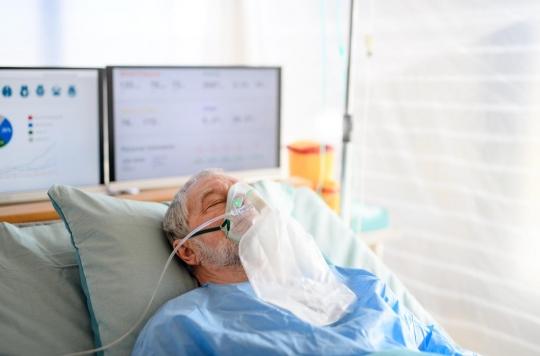The access of the elderly to intensive care services during the epidemic peak of coronavirus is controversial. Shedding light on this major issue.

- The median age of patients hospitalized in intensive care fell from 66 to 63 at the peak of the coronavirus epidemic.
- Deputy Éric Ciotti (LR) speaks of “a form of regulation which, without saying so, deprived the elderly of access to the hospital”.
- Anesthesiologists and geriatricians deny having changed their way of regulating patients, whose access to resuscitation is never systematic.
Were the elderly excluded from hospitals during the epidemic peak of coronavirus in France? This is the controversy started by The world. To support its theory, the daily reveals figures from the general direction of the offer of care (DGOS). The week of March 30 to April 5, only 14% of patients admitted to intensive care units were over 75, while they were still nearly 25% at the start of March. The median age of patients hospitalized in intensive care has also fallen from 66 to 63 years at the peak of the epidemic, and even to 60 years in Ile-de-France.
“We are not aware of everything, but mounting a controversy based on the figures that are presented is nonsense, deplores Jean-Michel Constantin, head of the anesthesia-resuscitation department at the Pitié-Salpêtrière Hospital (AP-HP) in Paris. The coronavirus has not changed the way we regulate patients, and we have not received any directives in this regard. Triage in intensive care is our daily life. Resuscitation is unnecessary suffering if the patient has no chance of getting out of it. With the coronavirus epidemic, we evaluated the patients with regard to age and comorbidities, as we usually do”, continues the doctor.
Based on the overall condition of the patient
Faced with the influx of elderly people affected by Covid-19, his department realizes that the mortality rates in intensive care were around 100% for the over 80s, and around 90% for the elderly. over 75 years old. For this type of profile, caregivers were then able to offer non-invasive ventilation, oxygen therapy or palliative care support, based on the overall condition of the patient. “We took 90-year-old patients in intensive care if their overall condition was good, and we never excluded the elderly from intensive care units on their simple identity card. In addition, when we did not take a patient to intensive care, we directed him to other services, without abandoning the care. This explains the drop in the median age of patients hospitalized in intensive care in the Paris region.further details Jean-Michel Constantin, before concluding: “The hospital did not fail.”
The idea of a sorting of the elderly by the nursing staff has been denounced by the National Consultative Ethics Committee since 2018. In a note, the instance speaks “of ageism”, taking in particular for example the care of our elders in the emergency services, where “caregivers do not tend to take care of them as a priority” elderly people, because of their difficulty in quickly expressing the symptoms that motivated their arrival, which can ultimately cause worsening of the condition and “generate even more vulnerability”.
Following the coronavirus epidemic, the controversy was relaunched by Éric Ciotti (LR), president of the parliamentary commission of inquiry into the impact, management and consequences of the Covid-19 epidemic. “There was a form of regulation which, without saying it, deprived the elderly of hospital access (…) Many could conceivably have been saved. It’s serious”, denounces the deputy of the Alpes-Maritimes in The world. During the hearing of Professor Jérôme Salomon, Director General of Health (DGS), Éric Ciotti asks: “Medical coordinators of social medical establishments [lui] have expressed difficulties in the regulation for the care of their patients who have been refused. Were these refusals part of the decision of the regulator of the 15th, or was it an instruction?
A condition too serious “to be able to benefit from resuscitation care”
According to a note we obtained, titled Secondary reassessment and alternatives to resuscitation, there would have been instructions sent to the General Directorate of Health to guide the care of patients in intensive care, but they were not centered on age.
“Are considered vulnerable are all adults, regardless of their age, presenting one or more chronic pathologies having repercussions on their ability to meet their daily living needs (getting up, washing, eating, eliminating, dressing , assessed by activity of daily living grids such as Katz’s ADL) and on their decisional autonomy”, explains geriatrician and doctor of ethics Sophie Moulias in her contribution, validated by COREB (Operational coordination epidemic and biological risk).
A hospitalized patient in a state of respiratory distress as part of a Covid-19 viral infection may be in too serious a condition “in order to benefit from resuscitation care. He will then have to be taken care of in a service that can provide palliative care, up to terminal care if necessary. continues Sophie Moulias. She invites caregivers to ask themselves: does therapeutic intervention only prolong the agony? How will the patient benefit from the treatment? Is the patient’s future quality of life compromised in the event of survival?
The note also lists objective criteria, used to try to predict an unfavorable evolution, even in the event of admission to critical care, and thus facilitate decisions:
o A fragility score greater than or equal to 4.
o A WHO score greater than or equal to 2 (performance evaluation, editor’s note).
o Moderate to severe malnutrition.
o A GIR score less than or equal to 2 (evaluation of autonomy, editor’s note).
“We can’t be satisfied with numbers”
“There is a form of ageism in France, it’s a basic problem that is unbearable. But there was no ageism in the health sense at the peak of the coronavirus outbreak. There may have been a few caregivers who panicked for fear of lack of resources, but it was not the hospital that was at the heart of the problem”, analyzes Olivier Guérin, president of the French Society of Geriatrics and Gerontology (SFGG) and head of the gerontology center of the Nice University Hospital (Alpes-Maritimes). “To find out if there has been this type of malfunction, it would be necessary to carry out very thorough investigations on the ground, we cannot be satisfied with the figures”, he concludes. It is also difficult to determine whether nursing homes have given up on their own to send their residents with symptoms of coronavirus to the emergency room.
.

















